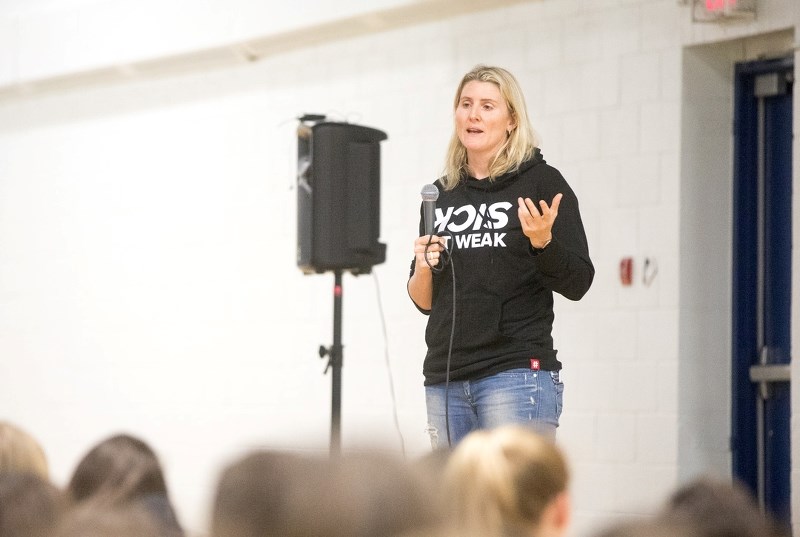Preparation and hard work in the driving rain helped a four-time Olympic gold medallist and Team Canada reach their apex in 2014.
A pre-season grind at a Penticton ski resort became the focal point for Team Canada as it waited in the locker room before the overtime period in the women’s gold medal hockey game against Team USA at the 2014 Winter Olympics in Sochi, Russia.
“There were only two things we talked about in the dressing room, food and Apex Mountain,” Hailey Wickenheiser told Okotoks Junior High School students in a packed gym. “We talked about how we did not do 45 days in hell in Penticton and four years of preparation to get to that point and then lose to the Americans.
“We were going for it — this was our Apex Mountain.”
Team Canada has spent 45 days at Apex Mountain in a grueling boot camp, which included mountain biking to the top of the hill in a torrential rainstorm to prepare for Sochi.
The Canadians came back from a 2-0 deficit late in the third period to force overtime. They would win it when Marie-Philip Poulin scored in what is the arguably the most-famous women’s hockey game in history.
Nearly three years later, the now-retired Wickenheiser was the keynote speaker at the Okotoks Junior High School Wellness Conference on Feb. 1.
“The one thing I want to express to you guys today is that you can do anything with preparation and a work-ethic,” she said. “On that day, that was the one thing we held on, we worked hard and trained harder than the Americans did.”
Wickenheiser, who won four Olympic gold medals and seven world championships in her career, knows a thing about perseverance. The 38-year-old Wickenheiser, who grew up idolizing Wayne Gretzky and Mark Messier in Shaunavon, Sask., didn’t have a Cassie Campbell or Hayley Wickenheiser as role models that female hockey players have today.
She was forced to play boys hockey because there wasn’t a girls game in Shaunavon at that time.
“I would have to walk through the lobby where all the parents were because I had to change in the bathroom and go to the dressing room where all the boys were,” she said. “That was the most nerve-wracking part of playing hockey.”
She learned not to listen to criticism of others — and how damaging words can be.
“I know that kids can be mean to each other,” she told the students. “I want you to think about what you say to someone can change their life — for the good or the bad.”
She urged the students to learn from those who care for them. Teachers, family and coaches helped her in her life and hockey career.
“They didn’t say: ‘Girls shouldn’t play hockey they should do something else,”’ said Wickenheiser. “So every time I stepped on the ice, my whole mission was, that anybody who came into the rink, they would leave and say: ‘That’s not a good girls hockey player — that’s a good hockey player.’”
She made her point.
Wickenheiser played in a men’s professional league in Finland in 2003, scoring two goals in 23 games. She is the all-time leading scorer in women’s Olympic hockey with 18 goals and 51 points. She was the flag bearer for Canada at the opening ceremonies for the Sochi Olympics.
She announced her retirement in January.
Wickenheiser left her mark on Okotoks player, Mackenzie Halifax, a Grade 9 player at OJHS.
“She showed that even after the boys said: ‘you’re aren’t as good as boys’ that she could play,’’ Halifax said. “I play with Global Sports Academy (at OJHS) and there are only three girls. We try to play just as good as them (the boys).”
She said girls hockey continues to grow in Okotoks.
“Even when I started there was one Atom team, now there are three,” she said. “That’s cool to see.”
At present, there are 13 female teams with the Okotoks Minor Hockey Association and three with the Okotoks Oilers Athletic Association (two midget and one bantam).
The all-time leading scorer in women’s Olympic hockey has noticed the quality – and quantity – of teams coming out of Okotoks.
“They have done a great job with the girls program – I have several teams from Okotoks come to my festival — Wickfest —it is nice to see the rural communities around Calgary developing good hockey players,” said Wickenheiser.




